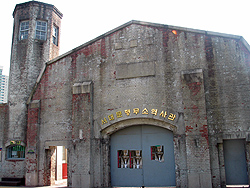Seodaemun Prision
The Yonsei University and Seodaemungu-office jointly held the 1st
Seoul-Shinchon art festival at Yonsei University and churches, parks,
movie
theaters in the Shinchon area under the theme Young, Global, Future.
The
opening ceremony will be held on May 4th at the Seodaemun prison history
hall, featuring various cultural performances and a media performance
in an
outdoor stage.
 Seodaemun Prison(Hyongmuso), which is located at 101, Hyonjo-dong, seodaemun-gu,
Seoul, was built during the japan's occupation at the end of Taehan
Empire, and it served as a major site of oppression during their forced
colonization. For almost 80 years, it has stood as a living monument
of our ordeal, and grief in the tumultuous times of modem Korean history.
Seodaemun Prison(Hyongmuso), which is located at 101, Hyonjo-dong, seodaemun-gu,
Seoul, was built during the japan's occupation at the end of Taehan
Empire, and it served as a major site of oppression during their forced
colonization. For almost 80 years, it has stood as a living monument
of our ordeal, and grief in the tumultuous times of modem Korean history.
When japanese occupid our nation by force, they unveiled their wild
ambition to launch a full scale invasion into the continent by using
our land as a bridgehead. At that time, they found it necessary to build
a prison to house the numerous patriotic martyrs who fought against
their invasion was begun in 1907 near Tongnimmun(Independence Gate),
which was estabilshed as a symbol of independence during the period
of Taehan Empire.
The prison was designed by a japanese architect with a construction
cost of 50,000 won(the then currency value), and consisted of detention
cells with a size of 480 pyung, and auxiliary facilities with a size
of 80 pyung(315 sq.). The scale of the prison, which could accomodate
a total of 500 inmates, was enormously large, considering that the entire
capacity of eight prisons across the country was only 300 inmates. The
prison was first opended on October, 21, 1908 under the name of Kyongsong
Kamok(traditional name of prison). When Japan initiated full-scale aggression
into korea, numerous Korean patriots nationwide rose up against the
invaders, to be arrested and imprisoned. As the number of inmates increased,
the Japanese constructed another prison in Kongdok-dong, Mapo-gu,and
accordingly,the first Kyongsong Kamok was renamed seodaemun Kamok in
September 3, 1912.
For more information please visit: http://www.seodaemun.seoul.kr/eng/prison_1.html




















